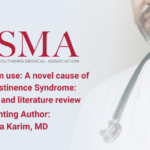Abstract | November 13, 2020
Maternal Kratom use: A novel cause of Neonatal Abstinence Syndrome – A case series and literature review
Learning Objectives
- To spread awareness about the effects of maternal use of Kratom, which is a novel substance, among both mothers and healthcare workers to prevent NAS secondary to its use.
- Upon completion of this lecture, learners should be better prepared to identify Kratom use as a potential cause of NAS especially among newborns with negative UDS and MDS and a dubious maternal history. In addition, they should educate mothers about the harmful potential of this supplement and its effects on their newborn.
Introduction: Maternal opioid use is a well-known cause of neonatal abstinence syndrome (NAS). However, for treating opioid dependence several women have been identified to sought after non-opioid alternatives, especially during pregnancy, to avoid withdrawal symptoms in their newborns. Kratom is a psychoactive herbal supplement with opioid activity and is marketed as a non-opioid remedy for opioid withdrawal. The active compounds are mitragynine and 7-hydroxymitragynine, which are selective and full agonists, respectively, at mu- opioid receptors. Although it is undetectable by standard drug screens, neonates have been found to be withdrawing and developing NAS when mothers’ history are positive for Kratom use.
Case presentation: We present two NAS cases secondary to maternal Kratom use. Both the neonates were term and developed withdrawal signs and symptoms within the first 36 hours of life and had elevated NAS scores. Subsequently, they were successfully treated with methadone. Therefore, awareness of the effects of maternal use of Kratom, which is a novel substance, is essential for better care for neonates, by both the healthcare providers and mothers.
Case 1: A 38-week male born vaginally to a 29-year-old G6 P4 A2 mother was transferred to our facility from a sister institute, where the patient was born, with the suspicion of NAS in the newborn. The patient was tremulous and was suspected to have seizures. On examination, the newborn had hypertonia, tremulousness and inconsolable crying. Mother had a significant history of marijuana, methamphetamines, suboxin (combination buprenorphine and naloxone) and tobacco use for 10 years but underwent rehabilitation and methadone wean one year before the pregnancy. However, it was found out that mom was on Kratom for the pain of contractions over the last two weeks before delivery. Due to suspicious seizure like activity, the patient was loaded with phenobarbital and a MRI of the brain and EEG were performed and reported as normal. Since his NAS scores were persistently above 12 within 28 hours of delivery, he was started on methadone. His urine and meconium drug screens (MDS) were positive for marijuana only. Methdaone was weaned over a course of 17 days. NAS scores remained less than 10 for 48 hours prior to discharge home.
Case 2: A 40-week and 4 day male born vaginally to a 34-year-old G6 P2 A4 mother was transferred from the newborn nursery at 36 hours of age secondary to tachypnea and elevated NAS scores. On initial exam, he did not show any significant features of withdrawal, however over the next 24 hours he developed hypertonia with a high pitched cry and jitteriness. He was given morphine initially but his NAS scores persistently remained elevated, therefore, he was started on methadone and taken off of breast milk. His MDS was negative. Subsequently, his mother reported 4 years of Kratom use as means to stay away from heroin. She also mentioned that Kratom is over-the-counter and easily available at gas stations. The patient required a 30 days whole month of methadone wean before he was successfully discharged home.
Final Diagnosis: Neonatal Abstinence Syndrome secondary to Kratom use
Management: Conventional Methadone wean protocol

